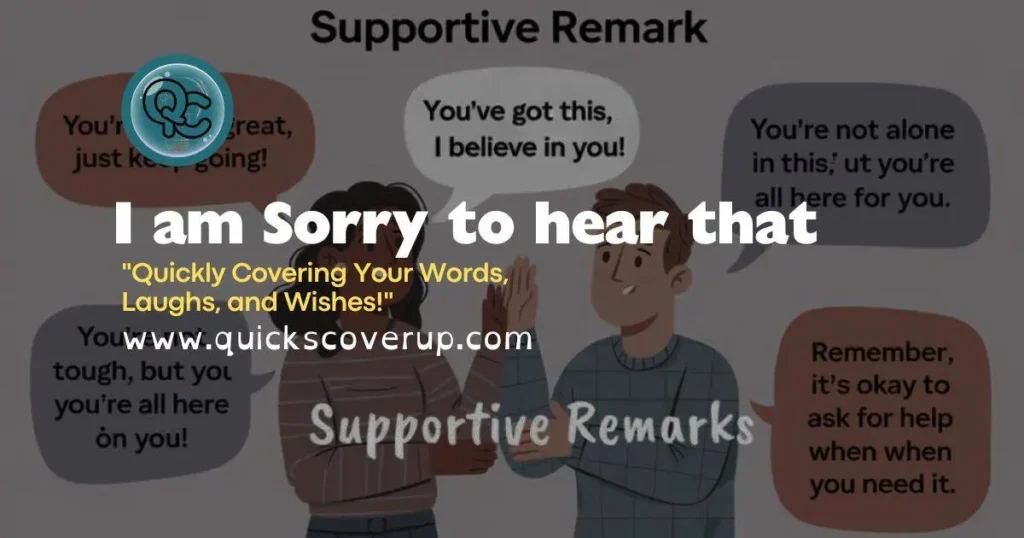Language is a powerful tool for expressing empathy, and your chosen words can significantly impact how your message is received. Instead of relying on the standard “Sorry to hear that,” consider alternatives that reflect your understanding of the person’s feelings.
Compassionate expressions are crucial when someone shares difficult news or is going through a tough time. While “I am Sorry to hear that” is a common phrase, it can sometimes feel generic or impersonal. Finding other ways to convey your concern can make your response more meaningful and genuine.
By using different phrases, you can better match the tone and context of the situation, offering comfort more sincerely. This not only strengthens your connection with them but also shows that you genuinely care about what they’re going through.
This article uses alternative phrases instead of “I am sorry to hear that,” which makes interactions more personal and meaningful.
Alternatives of “I am Sorry to Hear That” Professional Way
When someone shares difficult news, offering a more personal and sincere response can make a big difference. Here are 25 alternative phrases that show empathy and understanding:
1. Expressions of Compassion
- My heart goes out to you.
- I’m deeply sorry you’re experiencing this.
- I sympathize with your situation.
- I’m so saddened to hear this news.
- My sincere condolences on your loss.
- Please accept my deepest sympathies.
- I share in your sorrow.
- It pains me to hear you are going through this.
2. Sincere Acknowledgment
- That sounds tough.
- I can’t imagine how that feels.
- I wish I had the right words, just know I care.
- This must be so hard for you.
- I can only imagine how difficult this is.
- This must be a heavy burden for you.
- That’s unfortunate to hear.
- This news is deeply distressing.
- I’m saddened to learn about your recent hardship.
- It’s disheartening to hear such news.
- That’s very regrettable to hear.
3. Supportive Remarks
- I’m here for you during this difficult time.
- I’m here to support you in any way I can.
- I’m thinking of you during this challenging time.
- Please know you’re not alone.
- Your resilience is admirable; I’m here to help in any way I can.
- If there’s anything I can do to help, please let me know.
4. Considerate Responses
- Let me offer my sincere regrets.
- I’m sorry you have to face this challenge.
- I wish I had the right words, but please know I care.
- That sounds challenging.
Expressions of Compassion

If you’re exploring how compassion is expressed as part of understanding and managing emotions, it fits within the “Emotional Intelligence” category.
“My heart goes out to you.”
The phrase “My heart goes out to you” is a compassionate way to express deep sympathy. It shows that you genuinely feel for the person and share in their sorrow. This phrase can make your support feel more heartfelt, offering comfort in difficult times.
Usage examples:
- My heart goes out to you and your family during this challenging time.
- Hearing about your loss, my heart goes out to you.
“I’m deeply sorry you’re experiencing this.”
I’m genuinely sorry that you’re going through this tough time. It’s never easy to face such challenges, and I wish there were more I could do to ease your burden. Please know I’m here for you, offering my support in any way you need. Remember, you’re not alone in this, and we’ll get through it together.
Usage Examples:
- When a friend shares bad news about a job loss, you might say, “I’m deeply sorry you’re experiencing this. If you need someone to talk to, I’m here.”
- In a condolence letter to a colleague, you could write, “I’m truly sorry you’re going through this, and I’m here to support you in any way possible.”
“I’m so saddened to hear this news.”
The phrase “I’m so saddened to hear this news” expresses deep sorrow upon learning about someone’s difficult situation. It shows empathy and concern for what the person is going through. By saying this, you let the other person know that their pain matters to you and that you genuinely feel for them. This phrase helps to offer comfort during tough times.
Examples:
- “I’m so saddened to hear this news about your loss.”
- “I’m so saddened to hear this news about your recent hardship.”
“My sincere condolences on your loss.”
The phrase “My sincere condolences on your loss” is a way to express deep sympathy when someone has lost a loved one. It shows that you care and share in their grief. By offering your condolences, you are acknowledging their pain and offering support during a difficult time. It’s a kind and thoughtful way to comfort someone.
Examples:
- “My sincere condolences on your loss; I’m thinking of you.”
- “My sincere condolences on your loss; please let me know if you need anything.”
“I share in your sorrow.”
The phrase “I share in your sorrow” means that you feel the sadness someone else is experiencing. It shows that you are emotionally connected to their pain and that you are there for them. By saying this, you offer comfort by letting them know they are not alone in their grief. It’s a way to show deep empathy and support.
Examples:
- “I share in your sorrow during this difficult time.”
- “I share in your sorrow and am here to support you.”
“Please Accept My Deepest Sympathies”
The phrase “Please accept my deepest sympathies” is a way to express sincere sorrow for someone’s loss or hardship. It shows that you genuinely care about their pain and want to offer comfort. By saying this, you acknowledge their grief and offer support. It’s a kind gesture to show you are thinking of them.
Examples:
- “Please accept my deepest sympathies during this difficult time.”
- “Please accept my deepest sympathies for the loss of your loved one.”
“It pains me to hear you are going through this.”
The phrase “It pains me to hear you are going through this” expresses deep sorrow and concern for someone facing a difficult situation. It shows that your hardship affects them emotionally and that you genuinely care about what they are experiencing. By saying this, you let the person know that their struggles matter to you and that you empathize with their pain.
Examples:
- “It pains me to hear you are going through this; I’m here for you.”
- “It pains me to hear you are going through this difficult time.”
Sincere Acknowledgment

A sincere acknowledgement is a heartfelt recognition of someone’s effort, contribution, or presence. It goes beyond mere words and conveys genuine appreciation and respect.
“That sounds tough.”
When someone is going through a difficult time, saying, “That sounds really tough,” can show that you recognize difficulties and are empathetic. This phrase is a simple yet powerful way to validate their feelings without sounding overly formal or distant. It conveys that you acknowledge their situation’s difficulty and offer support in a genuine, relatable way.
Usage examples:
- If a friend tells you they’ve been dealing with stress at work, you might respond, “That sounds tough.” I’m here if you need to talk.
- A colleague mentions they’re having a hard time managing their personal life. You could say, “That sounds tough. Let me know if there’s anything I can do to help.
“I can’t imagine how that feels.”
Expressing empathy can sometimes be challenging, especially when we haven’t experienced what the other person is going through. Saying, “I can’t imagine how that feels,” is a thoughtful way to acknowledge their pain without pretending to understand it fully. This phrase conveys deep sympathy and shows you care, even if you haven’t been in their shoes.
Usage examples:
- After hearing about a friend’s loss: “I can’t imagine how that feels, but I’m here if you need to talk.
- When a colleague shares a personal struggle: “I can’t imagine how that feels. Please know you have my full support.
“I wish I had the right words, just know I care.”
The phrase “I wish I had the right words, just know I care” is used when you want to offer comfort but feel that words may not fully express your sympathy. It shows that, even though you might struggle to find the perfect words, your feelings of care and concern are genuine. By saying this, you let the person know that you deeply care about them, even if you can’t find the exact words to say.
Examples:
- “I wish I had the right words, just know I care about what you’re going through.”
- “I wish I had the right words, just know I care and am here for you.”
“I can only imagine how difficult this is“
The phrase “I can only imagine how difficult this is” expresses empathy by acknowledging that the other person is facing a challenging situation, even if you may not fully understand it. It shows that you recognize the challenge they are going through and that you sympathize with their struggle. By saying this, you let them know that you care and are trying to understand their pain.
Examples:
- “I can only imagine how difficult this is for you, and I’m here to support you.”
- “I can only imagine how difficult this is; please know that you’re in my thoughts.”
“This must be so hard for you.”
The phrase “This must be so hard for you” is used to show empathy and understanding when someone is going through a difficult time. It acknowledges the emotional or physical struggle they are facing and expresses concern for their well-being. By saying this, you let the person know that you recognize their pain and are there to offer support.
Examples:
- “This must be so hard for you; please remember I’m here if you need anything.”
- “This must be so hard for you, and I’m truly sorry you have to go through this.”
“This must be a heavy burden for you.”
The phrase “This must be a heavy burden for you” acknowledges that someone is dealing with a very challenging or difficult situation. It shows that you understand how overwhelming their circumstances might be and that you care about their well-being. By saying this, you express empathy and support, letting them know that you recognize the weight of their struggles.
Examples:
- “This must be a heavy burden for you; please don’t hesitate to reach out if you need help.”
- “This must be a heavy burden for you, and I’m here to offer any support you need.”
“That’s unfortunate to hear.”
The phrase “That’s unfortunate to hear” is used to express mild disappointment or sympathy when someone shares bad news or a negative situation. It shows that you regret the circumstances they are facing and wish things were different. This phrase is a polite way to acknowledge the difficulty of the situation without being overly emotional.
Examples:
- “That’s unfortunate to hear; I hope things turn around soon.”
- “That’s unfortunate to hear, but I’m sure you’ll handle it with strength.”
“I’m saddened to learn about your recent hardship.”
The phrase “I’m saddened to learn about your recent hardship” is used to express deep sorrow and empathy when you hear about someone’s difficult situation. It shows that you care about what they are going through and that their struggle affects you emotionally. By saying this, you let the person know that their hardship is essential to you and that you are there to offer support.
Examples:
- “I’m saddened to learn about your recent hardship; please know I’m thinking of you.”
- “I’m saddened to learn about your recent hardship and am here if you need anything.”
“It’s disheartening to hear such news.”
The phrase “It’s disheartening to hear such news” expresses a feeling of sadness and disappointment when you receive bad or troubling news. It shows that the news has affected you emotionally, and you feel empathy for the person experiencing the situation. By saying this, you convey that the news has a negative impact and that you are concerned for those involved.
Examples:
- “It’s disheartening to hear such news, and I’m truly sorry for what you’re going through.”
- “It’s disheartening to hear such news; please know that I’m here to support you.”
“That’s very regrettable to hear.”
The phrase “That’s very regrettable to hear” is used to express sincere disappointment or sorrow upon receiving bad news. It indicates that you feel sorry about the situation and wish things were different. This phrase conveys empathy and acknowledges the negative impact of the news on the person.
Examples:
- “That’s very regrettable to hear; I hope things improve soon.”
- “That’s very regrettable to hear, and I’m here if you need any support.”
“This news is deeply distressing.“
Acknowledging their pain with a compassionate statement can be comforting when facing a difficult situation. Saying, “This must be so hard for you,” shows empathy and understanding. It validates their feelings and lets them know you’re there to support them.
Usage Examples:
- I just heard about your job loss. This must be so hard for you. If you need to talk, I’m here.
- Finding out about your health issues is upsetting. This must be so hard for you. Let me know how I can assist.
“I sympathize with your situation.”
When you say, “I sympathize with your situation,” you express understanding and concern for someone’s difficulties. This phrase shows that you recognize their pain and want to offer comfort. It can be used when a friend is going through a tough time, like losing a job or facing a personal challenge.
Usage Example:
- if a colleague shares that they are overwhelmed with work, you might say, “I sympathize with your situation; I know how stressful it can be.”
- if a friend is dealing with a family issue, you could offer support by saying, “I sympathize with your situation, and I’m here if you need to talk.”
Supportive Remarks

Supportive remarks are encouraging words that uplift and reassure someone during challenging times. They show understanding, empathy, and a willingness to stand by others, fostering a sense of connection and confidence.
“I’m here for you during this difficult time.”
The phrase “I’m here for you during this difficult time” is used to offer support and reassurance when someone is going through a challenging situation. It shows that you are available to provide help, comfort, and companionship. By saying this, you let the person know they are not alone and that they can count on you.
Examples:
- “I’m here for you during this difficult time; please let me know if there’s anything I can do to help.”
- “I’m here for you during this difficult time, and I’m just a call away if you need to talk.”
“Please know you’re not alone.”
The phrase “Please know you’re not alone” is used to reassure someone that they have support and are not facing their difficulties by themselves. It expresses empathy and offers comfort, letting the person know that others care about them and are there to help. By saying this, you provide reassurance and a sense of companionship during their tough time.
Examples:
- “Please know you’re not alone; I’m here for you through this challenging time.”
- “Please know you’re not alone; don’t hesitate to reach out if you need support.”
“Your resilience is admirable; I’m here to help in any way I can.”
The phrase “Your resilience is admirable; I’m here to help in any way I can” acknowledges someone’s strength and determination in facing challenges. It shows respect for their ability to cope with difficulties and offers your support. By saying this, you let them know that their efforts are recognized and that you are willing to assist them however possible.
Examples:
- “Your resilience is admirable; I’m here to help in any way I can, so please let me know if you need anything.”
- “Your resilience is admirable; I’m here to help in any way I can and am just a call away if you need support.”
“If there’s anything I can do to help, please let me know.”
The phrase “If there’s anything I can do to help, please let me know” offers open-ended support and willingness to assist someone in need. It shows that you are ready and available to provide help or support in any way they might require. By saying this, you make it clear that you care and are prepared to take action if needed.
Examples:
- “If there’s anything I can do to help, please let me know; I’m here for you.”
- “If there’s anything I can do to help, please let me know, whether it’s big or small.”
“I’m here to support you in any way I can.”
When someone faces a challenging situation, offering support can be as simple as expressing your willingness to help, and using phrases beyond “sorry to hear that” can make your offer feel more genuine and impactful. Letting someone know you’re available for them can provide comfort and reassurance.
Usage Examples:
- I’m sorry you’re feeling this way. I’m here to support you in any way I can. Just let me know what you need.
- I can only imagine how difficult this is for you. Remember, I’m here to support you in any way I can, so don’t hesitate to reach out.
“I’m here for you during this difficult time.”
Expressing support can be incredibly comforting when facing a challenging moment. Saying, “I’m here for you during this difficult time,” assures them that they are not alone and that you are available to help. This phrase emphasizes your willingness to provide support and understanding.
Usage Examples:
- I heard about your recent loss. I’m here for you during this difficult time; let me know if you need anything.
- Navigating a job change can be stressful. Remember, I’m here for you during this difficult time, so feel free to reach out if you need support.
“I’m so saddened to hear this news”
Sometimes, “I’m so saddened to hear this news” can convey a deeper level of empathy when someone shares distressing information. This phrase acknowledges their pain and offers a heartfelt response. It shows you are genuinely moved by their situation and willing to provide support.
Usage Examples:
- I’m so saddened to hear about your father’s loss. If there’s anything I can do, please let me know.
- I’m so sad to hear this news about your job situation. I hope things turn around for you soon.
“I’m thinking of you during this challenging time”
When you want to show support beyond just saying “sorry to hear that,” expressing that you’re thinking of someone can be very comforting. Saying, “I’m thinking of you during this tough time,” conveys empathy and shows that you are there for them. It lets the person know they are in your thoughts, offering a sense of connection and reassurance.
Usage Examples:
- I heard about your recent loss. I’m thinking of you during this challenging time and hoping you find peace.”
- It sounds like you’ve been dealing with a lot at work. I’m thinking of you during this challenging time and am here if you need to talk.
“I can only imagine how difficult this is”
The phrase “I can only imagine how difficult this is” expresses deep empathy and understanding toward someone going through a tough time. It acknowledges their struggle without claiming to fully grasp their pain, making it a gentle way to offer support. This phrase is often used when you want to show compassion while recognizing the other person’s feelings.
Usage Example:
- When comforting a friend who lost their job, you might say, “I can only imagine how difficult this is for you. Losing a job is never easy, and I’m here for whatever you need.”
- If someone faces a serious health diagnosis, you could use the phrase to show understanding by saying, “I can only imagine how difficult this is for you and your family right now. Please know that I’m thinking of you.
“I’m sorry you have to face this challenge.”
“I’m sorry you have to face this challenge” expresses empathy and acknowledges the difficulty someone is going through. This phrase can be comforting, letting the person know they’re not alone in their struggles. Whether dealing with personal loss, a challenging project at work, or a health issue, it helps to convey support and understanding during tough times.
Examples of Usage:
- When a friend struggles with a demanding job assignment, you might say, “I’m sorry you have to face this challenge, but I believe in your abilities to overcome it.”
- If a family member is dealing with a severe illness, you could express your concern by saying, “I’m sorry you have to face this challenge. Please know I’m here for anything you need.”
“This must be a heavy burden for you.”
“This must be a heavy burden for you” acknowledges the emotional or physical weight someone carries due to a problematic situation. It conveys empathy and understanding, letting the person know you recognize their challenges. Whether someone is dealing with a tough job, a personal loss, or a significant responsibility, this phrase offers support without needing to delve into details.
Examples of Usage:
- After hearing about her friend’s struggle to balance work and family, Sarah said, “This must be a heavy burden for you,” showing she understood the stress her friend was under.
- When Mark confided in his colleague about the pressure of meeting an important deadline, his colleague replied, “This must be a heavy burden for you,” acknowledging the strain Mark was feeling.
Considerate Responses

Considerate responses are thoughtful and respectful replies that consider the feelings and perspectives of others. They reflect empathy, patience, and a genuine effort to communicate with care and understanding.
That sounds challenging
When someone shares their struggles, responding with “That sounds really challenging” acknowledges their difficulties with genuine concern. This phrase helps validate their feelings and shows that you understand the gravity of their situation. It’s a supportive way to express empathy without sounding repetitive.
Usage Examples:
- I heard about your recent setback at work. That sounds challenging, and I’m here if you need to talk.
- Dealing with health issues can be incredibly tough. That sounds challenging; please let me know if there’s anything I can do to help.
“I wish I had the right words; just know I care.”
Sometimes, finding the perfect words in tough situations is challenging, but expressing your care can be just as powerful. This phrase shows that your support and compassion are sincere, even if you don’t know exactly what to say. It’s a gentle way to convey empathy when words feel inadequate.
Usage examples:
- I’m at a loss for words, but I wish I had the right words. Just know I care and am here for you.
- This situation is complex, and I wish I had the right words. Just know I care deeply about what you’re going through.
Let me offer my sincere regrets.
The phrase “Let me offer my sincere regrets” expresses deep sympathy and apology for someone’s difficult situation or loss. It conveys that you genuinely feel sorry for their circumstances and want to acknowledge their pain. By saying this, you show that you care and are empathetic toward their experience.
Examples:
- “Let me offer my sincere regrets for the challenges you’re facing; I hope things improve soon.”
- “Let me offer my sincere regrets for your loss; please know you are in my thoughts.”
I’m sorry you have to face this challenge.
The phrase “I’m sorry you have to face this challenge” expresses sympathy and regret that someone is going through a difficult situation. It acknowledges their struggle and shows that you empathize with their hardship. By saying this, you convey that you recognize their difficulty and feel sorry that they are enduring such a tough time.
Examples:
- “I’m sorry you have to face this challenge; please let me know if there’s anything I can do to help.”
- “I’m sorry you have to face this challenge; I hope you find strength and support during this time.”
FAQ’s
1. What are some alternative phrases to “Sorry to hear that”?
Try saying, “That sounds tough,” or “I can’t imagine how hard this must be.” These phrases can express empathy in a more personal way.
2. Why should I use different phrases instead of “Sorry to hear that”?
Using varied phrases makes your support feel more genuine and thoughtful, showing that you care deeply about the person’s situation.
3. Can these alternatives be used in any situation?
Yes, these phrases are versatile and can be adapted to fit different contexts, whether comforting a friend or offering support to a colleague.
4. How can I choose the correct phrase to use?
Consider the person’s specific situation and your relationship with them. Choose a phrase that feels sincere and appropriate for the context.
5. Are there any phrases to avoid?
Avoid overly generic or dismissive phrases that might appear insincere, like “It could be worse.” Focus on expressions that show genuine empathy and concern.
Conclusion
Finding the right words to express sympathy can significantly impact how your support is received. Using any of these ten alternatives to “sorry to hear that,“ you can convey your empathy in a more personal and genuine way. Each phrase provides a different way of acknowledging someone’s difficulty and offering comfort. Tailoring your response to the situation can make your support even more meaningful. Remember, thoughtful words can make a big difference in times of need.
Also Read
15 Ways to Say “Happy Birthday in Advance”
25 Other Ways to Say “Thank You for Clarifying”
When and How to Use “Thank You for Letting Us Know”
30 Heartfelt Ways to Say “Thank You for Your Support”











